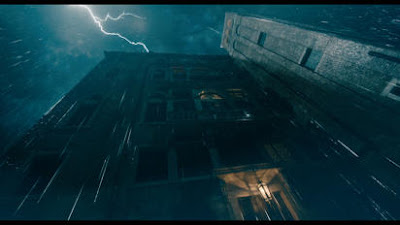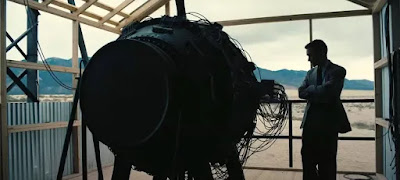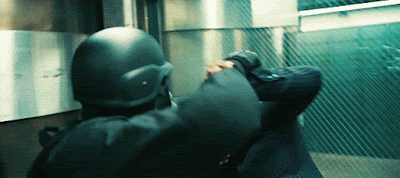or
"Lighten Up, Pal! You Might Have Fun!"
It is 1947. "World's greatest detective" Hercule Poirot (Kenneth Branagh), he of fusty ways (oh god, they haul out the "egg joke" again!) and the elaborate mustache—that looks like superimposed Aston Martin/Bentley logos—is in retirement. In Venice. "A gorgeous relic sinking into the sea" compares mystery novelist Ariadne Oliver (Tina Fey), who has skipped the long line of desperate potential clients waiting outside his door to tempt Poirot with a case which just might revivify her career after three critically-panned books.
Poirot will have none of it. A veteran of the first World War (as was shown in the previous film, Death on the Nile), he has lived long enough to see that its reputation as "the war to end all wars" has proved false and, having seen too much of death, has foregone his profession to ease the strain on his little grey cells. But, Oliver is persistent, and so he joins her on Hallowe'en night to the palazzo of opera star Rowena Drake (Kelly Reilly) to witness a festive party for local Venician children, and, for an adult after-party, a seance performed by the medium Joyce Reynolds (Michelle Yeoh) to try to quell the spirits haunting the Drake place, one of whom might be Rowena's daughter Alicia, who died "under mysterious circumstances" years before."Under mysterious circumstances" may be overstating, as the girl drowned in a city that is nothing but waterfront property—sort of like being surprised when there's an explosion at a munitions factory ("Non-smoking? Who knew?"). I'm just saying that the Venice polizia usually don't ask "cause of death?" as they fish another tourist out of the canal. That aside, there is some question as to whether Alicia's death was a suicide or an accident or...was it murder?Poirot, he does not care. He's there to expose the medium using his powers of observation and his absolute disbelief in the supernatural ("scary stories make life less scary"), suspecting that some grift will ensue from the proceedings. His convictions are only solidified when Alicia's former fiancee Maxime Gerard (
Kyle Allen) arrives after a mysterious invitation is sent his way so many months after the tragedy. Also in attendance is the family's doctor Leslie Ferrier and his son Leopold (Jamie Dornan and Jude Hilll, who played father and son in Branagh's Belfast) and the housekeeper Olga Seminoff (Camille Cottin), all of whom figured in the care-taking of the daughter before her death. It all seems very neat and tidy.
The seance is anything but. It's a convincing show, with Reynolds going into a trance, speaking in the dead girl's voice, spinning in place and with messages appearing on a typewriter ("I think of myself more of a secretary than anything" says Reynolds), seemingly written by "the lost girl from beyond." Nature conspires with the supernatural as a violent thunderstorm permeates the whole procedure. But, the mysteries linger on with Poirot nearly killed bobbing for apples (true!), strange voices permeating the house, flashes of the dead girl from beyond, and...a couple of grisly murders most foul.
Kyle Allen) arrives after a mysterious invitation is sent his way so many months after the tragedy. Also in attendance is the family's doctor Leslie Ferrier and his son Leopold (Jamie Dornan and Jude Hilll, who played father and son in Branagh's Belfast) and the housekeeper Olga Seminoff (Camille Cottin), all of whom figured in the care-taking of the daughter before her death. It all seems very neat and tidy.
The seance is anything but. It's a convincing show, with Reynolds going into a trance, speaking in the dead girl's voice, spinning in place and with messages appearing on a typewriter ("I think of myself more of a secretary than anything" says Reynolds), seemingly written by "the lost girl from beyond." Nature conspires with the supernatural as a violent thunderstorm permeates the whole procedure. But, the mysteries linger on with Poirot nearly killed bobbing for apples (true!), strange voices permeating the house, flashes of the dead girl from beyond, and...a couple of grisly murders most foul.
A Haunting in Venice is based on Dame Agatha Christie's 1969 novel "Hallowe'en Party" and in much the same way that later James Bond movies are based on Ian Fleming novels—that is, not very. Scenarist Michael Green (he's done the scripts for all of Branagh's Poirot films as well as Logan and Blade Runner 2049) has retained some of the names, but murdered Christie's plot and hatched one of his own (mind you, all with the tacit approval of the Christie Estate). Although it ties up all physical loose ends, it ends up with an implicit endorsement of the supernatural (if only in sub-text, but is rather jarring when its chief detective is committed to exposing the charlatan exploiters of the belief, and a couple of glaring motivations amidst a couple of suspects.
Perhaps because he knew the weakness of the script, Branagh the director works overtime establishing an atmosphere that disorients and distracts. His compositions are full of dutch angles and high and low shots, fish-eye lenses, and full of conversations with askance sight-lines. That's not "normal" film-making (and by that I mean "professional" film-making that obeys "all the rules" and creates a comfortable-to-the-eye-and-mind viewing experience). Branagh's choices are Wellesian in their disregard for viewer comfort; discomfiture is actually key to making the film work. By setting audiences "on edge" and making things look "off" you can get away with a lot of chicanery in a burst of style over substance.That may sound dismissive, but Branagh has typically been a director of verisimilitude—making things look real. Here, he deliberately makes things surreal, claustrophobic and, often, acrophobic (which is a lot of work!), but it breaks a cardinal rule—never call attention to your directing (a rule too often ignored by beginning film-makers.) The result is so showy and over-the-top that one just might forget the story-line for all the sights to see.
In this case, it's a good strategy. The script is a let-down, full of incident and the occasional zinger of a line, but too convenient and incredulous simultaneously to make a well-conceived plot both among the movie's conspirators and behind-the-scenes in the writer's room. Branagh's work and collaboration with cinematographer Haris Zambarloukos (he's done Branagh's last few films...AND Meg 2: The Trench), however, overcompensates to a degree that one feels that one has seen a real show, full of acrobatics and elephants in the room (and one abrasive cockatoo!) to marvel at, even if the little grey cells are not entirely engaged and unconvinced.
It sure looks good, even if it's as insubstantial as a ghost.






















































